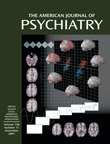Cortical Responsiveness During Inner Speech in Schizophrenia: An Event-Related Potential Study
Abstract
OBJECTIVE: The study assessed the effects of inner speech on auditory cortical responsiveness in schizophrenia. METHOD: Comparison subjects (N=15) and patients with schizophrenia (N=15) were presented with acoustic and visual stimuli during three conditions: while subjects were silent, when spontaneous inner speech might occur; during directed inner speech, while subjects repeated a statement silently to themselves; and while subjects listened to recorded speech. N1 event-related potentials were recorded during the three conditions. RESULTS: N1 event-related potentials elicited by acoustic stimuli, but not by visual stimuli, were lower during directed inner speech than during the silent baseline condition in the comparison subjects but not in the patients. CONCLUSIONS: Abnormal auditory cortical responsiveness to inner speech in patients with schizophrenia may be a sign of corollary discharge dysfunction, which may potentially cause misattribution of inner speech to external voices.



